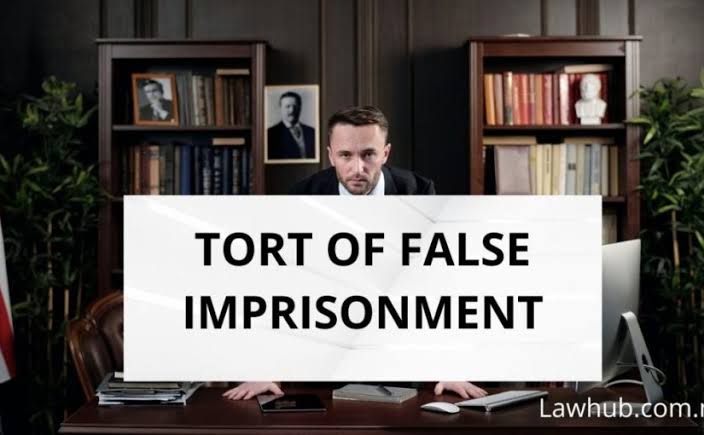N.B. This article is particular to Nigeria.
Tort of False Imprisonment
False imprisonment is a Total restraint of the liberty of a person for however short a time without lawful excuse. It should be noted that there need not be any actual imprisonment in the ordinary sense.
In other words, imprisonment has a wider meaning because there may be effectual imprisonment without any walls of any kind. According to Coke C.J
“Every restraint of the liberty of a man is an imprisonment, though he be not within the walls of any common prison”
It is a fundamental requirement of the tort that the plaintiff’s freedom of movement in every direction must have been restricted. “A partial restraint is not sufficient” it must be noted that the restraint must be complete and total, if the plaintiff must succeed in an action for the tort of false imprisonment. In other words, if the plaintiff is free to move in many directions and he was only prevented from moving in one direction, then it would not be considered as constituting the tort of false imprisonment.
In the case of Bird V. Jones, the defendant wrongfully enclosed a part of the public footpath on the Hammersmith bridge and put seats on it for the use of spectators for a boat race on the river and charged for admission into the closure. The plaintiff insisted on passing across the footpath and climbed over the fence of the enclosure without paying the charge. The defendant prevented him from proceeding but told him he could cross to the other side. He refused and remained there. In an action brought for damages, it was held that the defendant was not liable.
Another characteristic of this tort is that it may be committed without physical force. The use of authority is enough. For instance, if a policeman wrongfully orders a plaintiff’s to accompany him to the police station for questioning, the police officer may be liable for false imprisonment. Conversely, an invitation by a police officer to accompany them to the police station cannot be false imprisonment if it was made expressly to him. The case of Aigoro V. Anuebunwa is an illustration.
DEFENCES OPEN TO TRESPASS TO PERSON
- Self-defense: An assault or battery is justified if committed in reasonable defense of one’s self to another. Self-defense has been a common law right for centuries & it is now supplemented by stationary rights to use reasonable force to prevent a crime. This is evident bin the provisions of Section 286-288C.C & section 60 of the penal code.
As stated in cook V. Beal, what is reasonable depends in the circumstances. The defense will only operate if the force used by the defendant is commensurate to that applied by the attacker as evident in Turner V. M.G.N. - Reasonable Chastisement: Traditionally, there has been the case that parents or guardians have the legal right to smack or confine their children & will not be liable for false imprisonment. This is part of the administering of reasonable punishment provided the amount if force is reasonable as stated in S. 295(1) c.c
- Consent: consent negates. A tort of consent & battery may be express or implied, direct or indirect. In other words, if the plaintiff consented either expressly or impliedly to the tort of assault & battery, there will be a complete defense. As seen in the case of Wright V. McClean. For instance, those who participate in sports consent to reasonable contact within the rules of a particular game & cannot recover damages for blows inflicted during a boxing match.
- Ejection of trespasser: A person entering into a premise of another against the will of that person, may be ejected with force or violence as seen in Brantap daji V. Barbey boroda & central indian railway. In that case, the plaintiff who failed to purchase a ticket by oversight enters a railway on detention, he was asked to leave but refused. He was forcefully thrown out. It was held that the use of necessary force to remove him was lawful.
Contributed by: Abdulganiyu Ismail (AKA) Mastermind
Prepared and Written by: Ucheakonam Chijioke Joshua (CJ)


Leave a Reply